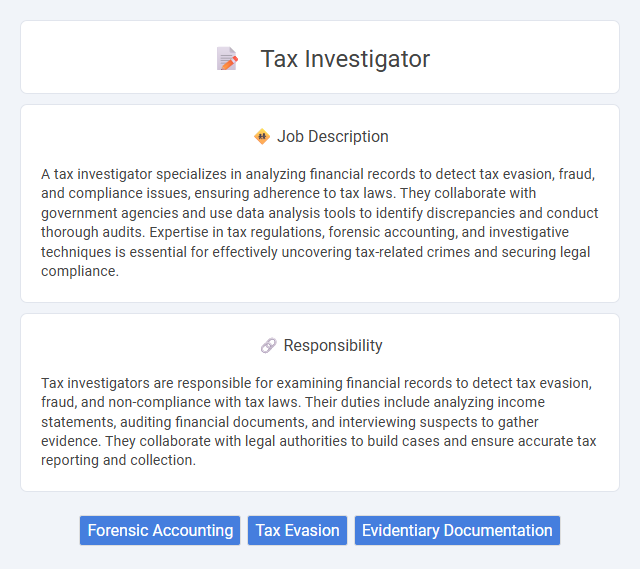
A tax investigator specializes in analyzing financial records to detect tax evasion, fraud, and compliance issues, ensuring adherence to tax laws. They collaborate with government agencies and use data analysis tools to identify discrepancies and conduct thorough audits. Expertise in tax regulations, forensic accounting, and investigative techniques is essential for effectively uncovering tax-related crimes and securing legal compliance.
Individuals with strong analytical skills and attention to detail are likely suitable for a tax investigator role, as the job requires thorough examination of financial records and spotting discrepancies. Those who are comfortable working independently under pressure and possess a high level of integrity may have a higher probability of success in this position. People who struggle with complex problem-solving or prefer less structured work environments might find this job less suitable.
Qualification
A tax investigator typically requires a bachelor's degree in accounting, finance, or a related field, with many employers preferring candidates who hold professional certifications such as Certified Public Accountant (CPA) or Certified Fraud Examiner (CFE). Strong analytical skills, attention to detail, and proficiency with tax laws and regulations are essential qualifications. Experience in auditing, forensic accounting, or investigative roles significantly enhances a candidate's ability to detect tax fraud and ensure compliance.
Responsibility
Tax investigators are responsible for examining financial records to detect tax evasion, fraud, and non-compliance with tax laws. Their duties include analyzing income statements, auditing financial documents, and interviewing suspects to gather evidence. They collaborate with legal authorities to build cases and ensure accurate tax reporting and collection.
Benefit
A tax investigator role likely offers a competitive salary and benefits package, including health insurance and retirement plans. Job security and opportunities for career advancement may be strong due to the consistent demand for tax compliance enforcement. Employees in this position probably gain valuable experience in financial analysis and legal regulations, enhancing their professional skill set.
Challenge
Tax investigator roles likely involve complex challenges in analyzing financial records to uncover discrepancies and potential fraud. The probability of encountering sophisticated schemes means strong analytical and forensic skills are essential. Ongoing changes in tax laws might require continuous learning and adaptability to effectively address evolving challenges.
Career Advancement
Tax investigators play a critical role in identifying and resolving tax fraud and compliance issues, making deep knowledge of tax laws and regulations essential for career advancement. Progression typically involves moving from junior investigator roles to senior analyst positions, with opportunities to specialize in forensic accounting or criminal tax enforcement. Developing expertise in data analysis and gaining certifications like Certified Fraud Examiner (CFE) significantly enhance prospects for leadership roles within government agencies or private sector compliance units.
Key Terms
Forensic Accounting
Tax investigators specializing in forensic accounting analyze financial records to detect tax fraud, embezzlement, and other financial crimes. They employ advanced auditing techniques, data analysis, and forensic methodologies to trace hidden assets, recover unpaid taxes, and provide evidence for legal proceedings. Expertise in tax laws, accounting principles, and investigative skills is essential to identify discrepancies and support regulatory compliance.
Tax Evasion
A tax investigator plays a crucial role in identifying and addressing tax evasion by analyzing financial records, conducting audits, and investigating suspicious transactions. They utilize forensic accounting techniques and collaborate with legal authorities to ensure compliance with tax laws and recover unpaid taxes. Expertise in tax regulations and investigative procedures is essential for effectively uncovering fraudulent activities and preventing revenue loss.
Evidentiary Documentation
Tax investigators meticulously collect and analyze evidentiary documentation to uncover tax fraud and ensure compliance with tax laws. They scrutinize financial records, bank statements, and transactional data to build a robust evidence base for audits or legal proceedings. Proficient in forensic accounting and legal standards, tax investigators prepare detailed reports that support regulatory actions and prosecutions.
 kuljobs.com
kuljobs.com